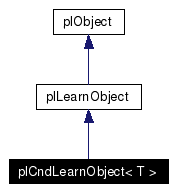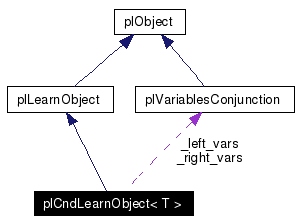
#include <plLearn.h>
Inheritance diagram for plCndLearnObject< T >:


Public Member Functions | |
| plCndLearnObject (const plVariablesConjunction &left_vars, const plVariablesConjunction &right_vars) | |
| Constructor using the two sets of variables {left_vars} and {right_vars} (i.e. | |
| plCndLearnObject (const plVariablesConjunction &left_vars, const plVariablesConjunction &right_vars, const T &init_object) | |
| Constructor using the two sets of variables {left_vars} and {right_vars} (i.e. | |
| virtual | ~plCndLearnObject () |
| Destructor. | |
| void | reset () |
| Resets learning. | |
| void | internal_addPoint (const plDataValues &point, double weight=1.0) |
| Adds a point {point} with a given weight {weight} and updates the statistics. | |
| const map< plDataValues, T > & | get_map () const |
| Returns the learnt map. | |
| void | get_params (plValues ¶ms, const plValues &right_value) |
| Returns in the output parameter {params}, for a given value {right_value} of the right variables, all learnt parameters. | |
| plKernelMap | get_kernel_map (const void *parameters=NULL) const |
| Creates the kernel map corresponding to the learnt conditional distribution. | |
Learning a conditional distribution P(X | Y) for a given learning object type (template parameter) T, consists in building a map of non-conditional learning objects of type T. This map will contain, for each possible value of Y a non-conditional learning object of type T on X.
Definition at line 195 of file plLearn.h.
|
||||||||||||||||
|
Constructor using the two sets of variables {left_vars} and {right_vars} (i.e. to learn the conditional distribution {P(left_vars | right_vars)}). |
|
||||||||||||||||||||
|
Constructor using the two sets of variables {left_vars} and {right_vars} (i.e. to learn the conditional distribution {P(left_vars | right_vars)}). |
 1.4.1
1.4.1